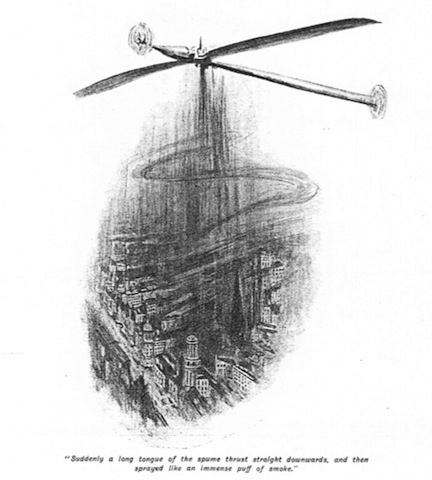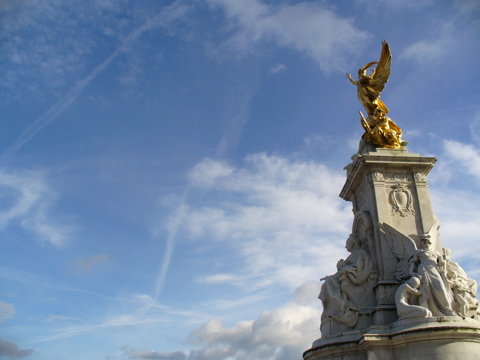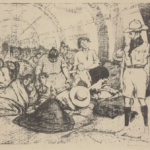Yesterday was the 63rd anniversary of the Bethnal Green Tube disaster. On the evening of 3 March 1943, 173 people — men, women and children — died at the Bethnal Green Tube station, the greatest loss of life of any single incident during the German bombing campaign against Britain. The tragedy took place during an air raid; the as-yet unused Underground station was one of London’s biggest deep air raid shelters. Yet the deaths were not due to bombing; in fact no bombs fell nearby. Hundreds of people were streaming down the steps into the station. The crowd panicked and surged forward, a woman holding a baby fell and tripped, and the people behind her piled into one another and were crushed to death. (The woman survived, but the baby died.)
Why did they panic? It seems that it was because a secret new anti-aircraft weapon, which fired salvos of sixty rockets at a time, was being tested in a nearby park. The rockets made a very loud roaring sound as they were launched; moreover, the sound was unfamiliar and may have been mistaken for a new type of German weapon. As one resident recalled about that night on the BBC’s WW2 People’s War site:
I had to go back to the flat for something – don’t remember what, as soon as I had entered the flat there was a horrendous roar and the place lit up. I hadn’t heard that noise before and waited for the explosions, there were none other than the local guns firing and shells bursting overhead.
When I got back to the shelter everyone was asking what the noise was?
This shows how familiarity breeds contempt, at least when it comes to air raids — civilians can cope with a lot if they know what to expect, especially if reality turns out to be not as bad as was feared. By 1943 bombing raids were routine, but the noise from the rockets was something new, and strange; for a brief moment, it caused the sort of panic that was supposed to take place during the knock-out blow.
Some useful links: an exercise at the National Archives addressing the question, why did Bethnal Green happen, including excerpts from the then-secret government report into the disaster; the WW2 People’s War article on Bethnal Green, and another near-witness’s report.
![]() This work is licensed under a Creative Commons Attribution-NonCommercial-NoDerivatives 4.0 International License.
Permissions beyond the scope of this license may be available at http://airminded.org/copyright/.
This work is licensed under a Creative Commons Attribution-NonCommercial-NoDerivatives 4.0 International License.
Permissions beyond the scope of this license may be available at http://airminded.org/copyright/.




Another great post, Brett, and on an event which I’m constantly surprised is still not widely known about – even amongst the thousands who, like myself, regularly travel through Bethnal Green on the Central Line.
However, from what I’ve read on it, there are almost-intangible factors of human ‘guilt’ and ‘shame’ to add to the secrecy of the government report, and the general confusion and sheer terror. The awful sense that people’s own actions – albeit _entirely_ understandable – contributed to the horrific event makes it all the more tragic.
There was a decent piece on this in The Guardian’s Saturday supplement a couple of years back (maybe for the 60th anniversary?) which you might want to look for in the Guardian’s online archive.
You’re exactly right about the shame/guilt, Jack! In fact I think there is a lot of that sort of thinking going on in predictions of the knock-out blow, particularly where the working classes were involved (not sure what Bethnal Green is like now, but back then it was definitely working class). It was assumed they would behave irrationally in air raids and be a major part of the problem; the government even considered cordoning off London with troops and police in order to prevent workers from fleeing in panic. The “Blitz spirit” was something of a surprise then, and a welcome one, but probably it was all too easy to slip back into the pre-war language when things like Bethnal Green happened, or maybe more that negative assumptions about the working classes resurfaced when they had a chance.
Bethnal Green, or ‘Befnal Green’, as it comes out in cockney pronunciation, is still a predominantly working-class area. In fact, it still comes very close to the quintessential London ‘East End’ (and even “EastEnders”) cockney stereotype – with the welcome added factor that it is now a highly multicultural area. I had a little look around recently, as it is where The People Show, who I’ve been researching and blogging about, are based. It is also very close to Mile End, home of Queen Mary, University of London. As you know, it was the whole Bethnal Green-Bow-Mile End-Stepney Green area, i.e., the historic East End, which was hit particularly hard by the Blitz. (One stated aim of basing the 2012 Olypics in nearby Stratford is to help ‘regenerate’ this whole area…)
There is a small monument near the tube station.
When I get to London I’ll have to visit Befnal Green and check it out!
Does anyone know where I can get a list of names of those who died? I vaguely remember my grandmother saying she was there with her sister.
Can anyone advise me?
Thanks. Sara
As it happens, I can, but only because a post by diamond geezer has just popped up with the answer in my RSS reader! There’s a group trying to raise funds to build a more striking memorial to the Bethnal Green tragedy, and they have a website with a list of names of the dead: http://stairwaytoheavenmemorial.org/.
Dear Sarah Barratt you can see a list of names on the stairway to heaven web site. My neighbour Joan Elsom was 19 and she was the first one to take the phone call at control headquarters on that terrible night. she had to type the list of names, she wasnt allowed to talk about it and when she eventually was allowed home two days later she wasn t even allowed to tell her parents. At 19 this must have been dreadful for her, it has stayed with her all her life, she is now an amazing lady of 86, with the most remarkable memory. she has wrtten her account of The tube disaster and sent it to Alf who was saved at the age of 7 and has campaigned for a fitting memorial for the people who lost their lives. So hope this helps you. regards anna courts
I remember my Mum telling us that when she visited Bethnal green hospital to see her Mother at that time she had to walk past tons of dead bodies in her walk to the ward. She knew nothing of the disaster and wondered what was going on.
I think he may have been mistaken but my Dad mentioned that he was told that local pickpockets were at work at the time and were thought to have panicked people and caused the disaster.
Pingback: Airminded · Monday, 7 October 1940
My sister and I were near Victoria Park, on our way home to Bow, on the evening of March 3rd. The sirens sounded and we heard gunfire getting closer, then suddenly the rocket battery in the park fired a salvo. This was the first time we had heard them and they literally screamed up into the sky – a most terrifying sound. This was followed by the noise of the warheads exploding, and the we heard quite a lot of clanking noises as bits of the rockets fell back to earth nearby.
I’m not surprised that some people pannicked, and it only needed a few to fall to cause the ensuing disaster.
Herbert:
Thank you for that, it’s a remarkably vivid insight into what the rockets sounded like and why they caused panic. May I ask if you remember hearing anything about the disaster at the time? Or did you only find out what happened after the war?
Those people living in the area knew about the disaster on the following morning, but I can’t recall when it became known that the probable cause of the panic was the rockets launched from Victoria Park.
Regarding news being officially announced, I recall when the first V1 ‘Doodlebug’ hit the railway bridge in Grove Road, Bow. It was just 200 yards from our house in Tredegar Terrace, and like most other people I thought that a plane had been shot down while it still had its bomb load on board. No official announcement was made in the next two days, but then the V1 attack started in earnest and we were informed that the Germans were using this new weapon.
Thanks for the followup, Herbert! The gap between official and public knowledge can be hard for historians to reconstruct. Do you remember any rumours about other V-weapons, besides the V-1 and V-2? I wrote about some of these (non-existant) V-weapons recently, here, so I’d be interested to know if they were something people talked about.
No Brett, I don’t recall any discussion of other possible secret weapons.
The V1’s pulse jet engine made an incredible throbbing noise, which was itself quite scary. The engine normally stopped at some pre-programmed point, and then there was aa rather frightening silence while it made a glide down to the ground, followed by the expolsion.
Occasionally there was a malfunction and the V1 dived into the ground under power, so the warning silence wasn’t there.
The V2s were supersonic so you herad the explosion, followed by the sound of it rushing earthward.
Thanks for the further update, years later this time! I’ve heard that the difference between the way the V-1 and the V-2 fell – as you say, the V-1 made this eerie throbbing sound which then stopped before the explosion; the V-2 being supersonic exploded before you heard anything – meant that the V-1 actually created more fear than the V-2, despite the latter being able to carry a somewhat bigger warhead. Was that your experience?
Yes that certainly was my experience. When a V1 was heard you were immediately on notice that there was going to be a major explosion somewhere. Would it be close to you, or were you even at the point of impact? You just had to wait and see, and the short silence after the engine stopped was very nerve-wracking. On the other hand, when a V2 exploded, this was your first intimation that one had been launched, and it was all over. It was a worry, of course, but less so in my opinion than the V1.
Thanks again!